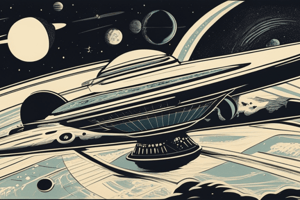Podcast
Questions and Answers
Which planet is closest to the sun?
Which planet is closest to the sun?
- Mercury (correct)
- Saturn
- Earth
- Mars
How many confirmed moons does Jupiter have according to NASA?
How many confirmed moons does Jupiter have according to NASA?
- 79
- 3,743
- 53 (correct)
- 0
What are celestial bodies that are made up of metal, rock, or a combination of the two, and orbit the sun?
What are celestial bodies that are made up of metal, rock, or a combination of the two, and orbit the sun?
- Moons
- Comets
- Asteroids (correct)
- Meteoroids
What is the term used for a meteoroid that survives the atmosphere and hits the ground?
What is the term used for a meteoroid that survives the atmosphere and hits the ground?
Which type of planets do not have a solid surface and are comprised primarily of gases?
Which type of planets do not have a solid surface and are comprised primarily of gases?
Which planet is thought to have no moons?
Which planet is thought to have no moons?
What is the mnemonic device for remembering the correct order of the planets?
What is the mnemonic device for remembering the correct order of the planets?
What are celestial bodies that float through space and are detailed later in this lesson?
What are celestial bodies that float through space and are detailed later in this lesson?
What is a key criterion for a celestial body to be designated as a planet?
What is a key criterion for a celestial body to be designated as a planet?
What led to the controversy surrounding the number of planets in the solar system in 2006?
What led to the controversy surrounding the number of planets in the solar system in 2006?
What celestial bodies are part of Earth's solar system?
What celestial bodies are part of Earth's solar system?
What caused the controversy surrounding the number of planets in the solar system?
What caused the controversy surrounding the number of planets in the solar system?
What is the primary reason for the evolving definition of a planet?
What is the primary reason for the evolving definition of a planet?
What distinguishes a celestial body as a planet in terms of its orbit?
What distinguishes a celestial body as a planet in terms of its orbit?
What is the defining characteristic of a celestial body to be considered a planet?
What is the defining characteristic of a celestial body to be considered a planet?
Flashcards are hidden until you start studying




